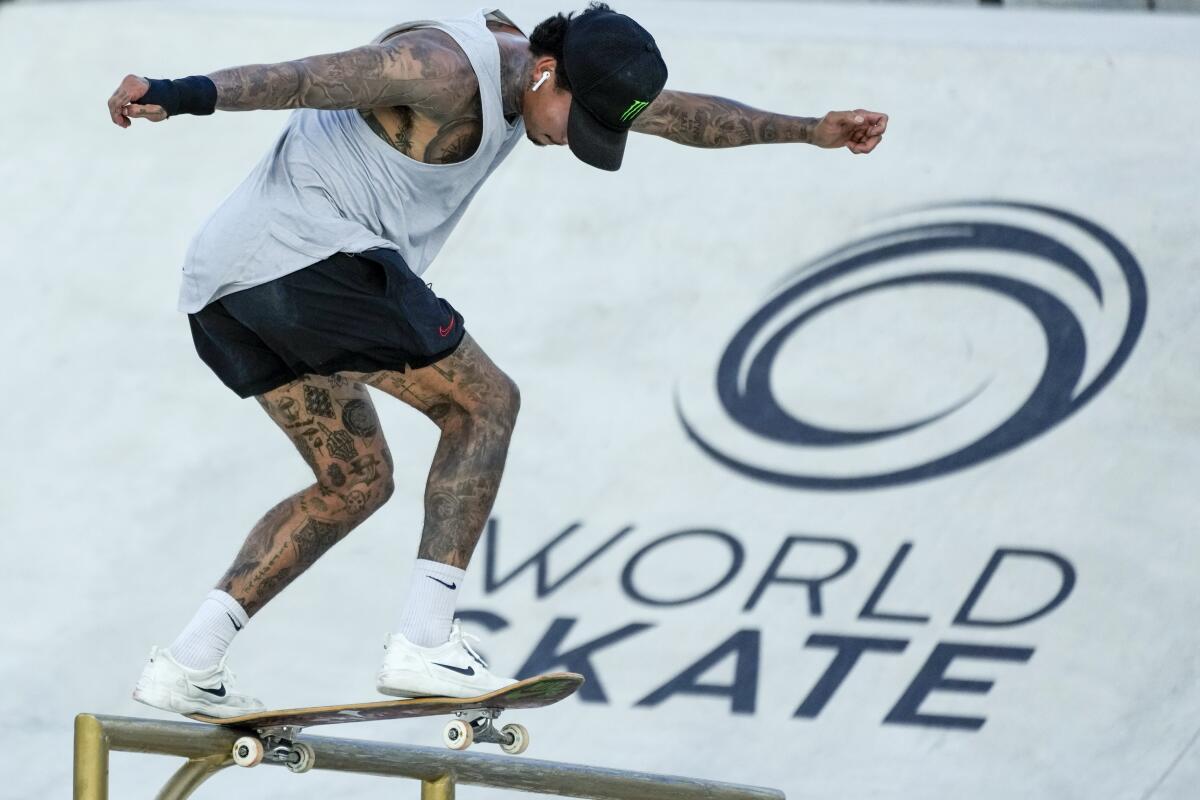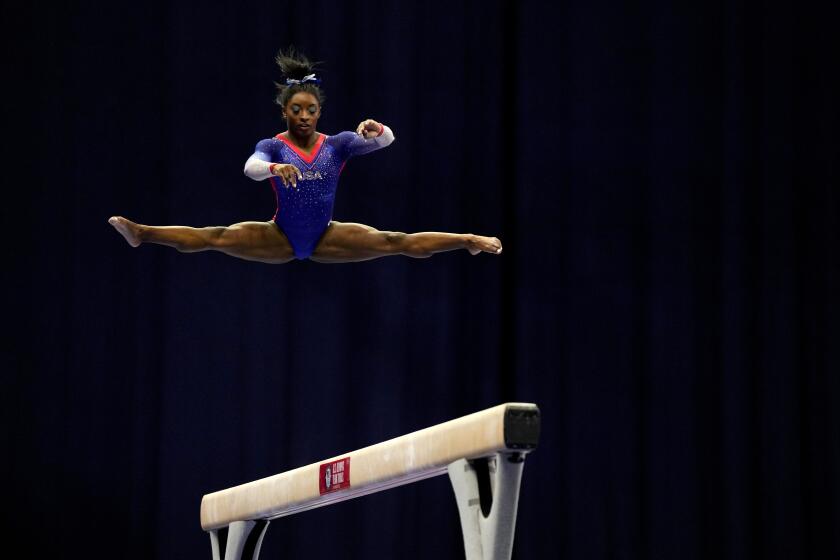New sports to watch during the Tokyo Olympics

Take a closer look at the format and rules for all the new sports added to the Tokyo Olympics:
Surfing
What are the rules?
The competition in Tokyo will be on shortboards, with 40 athletes split evenly between men and women.
Five judges will score all rides in each heat spanning about 20-25 minutes based on degree of difficulty, innovation and progression, variety, combination of major maneuvers and speed, power and flow. The winners of each four-person heat are determined by the combined score of the athleteâs best two rides and the winners advance to the next round of competition.
L.A. â28 is still seven years off, but the Olympic debut of surfing and skateboarding is turning the Tokyo Games into a SoCal showcase.
Maneuvers can include the following:
- The cutback is a fundamental surfing move, with the competitor creating a horizontal direction change. The rider and board reverse the original forward path on the wave. It allows the surfer to return from the shoulder of the wave to the critical section of the wave.
- The off-the-lip is a vertical turn during which the surfer turns on the steeper, more vertical part of the wave. Contact is made with the lip of the breaking wave and then the surfer drives the board down toward the bottom of the wave.
- The snap, also known as slash, is a radical change of trajectory in the pocket or on the top of the wave. When it is performed abruptly, it produces buckets of spray above the surfer.
- The aerial is a progressive maneuver during which the surfer gains speed and uses the wave height to project and launch above the lip of the wave.
- The tube ride is considered the most desired maneuver in surfing. It consists of riding, being fully covered, and disappearing behind the hollow lip of the breaking wave.
Competition will be held at Shidashita Beach, also known as Shida, which is about 40 miles outside the Japanese capital in the Chiba prefecture.
Who are the favorites?
Top surfers typically come from the United States and Australia, although Brazil and host country Japan could also be contenders. Southern California resident Kelly Slater, 49, lobbied to get surfing added to the Olympic slate and narrowly missed qualifying for the Games.
Sport climbing
What are the rules?
Olympic sport climbing will consist of speed, bouldering and lead competition. During speed climbing, two climbers face off while scaling a route on a 15-meter wall. During bouldering, athletes scale fixed routes on a 4.5-meter wall during a set time period. And during lead climbing, athletes climb as high as possible on a wall measuring more than 15 meters within a set time period.
Each climber will compete in all three disciplines, and the medal positions will be determined by multiplying the placement in each discipline, with the athletes achieving the lowest scores winning.
That humans can scale a 50-foot wall, scurrying from one small climbing hold to the next, and tap the buzzer in about six seconds makes this new Olympic event startling.
The only equipment permitted is safety ropes in some instances. Athletes primarily rely on their shoes and bare hands.
Sport climbing will feature 20 men and 20 women competing for six medals.
Who are the favorites?
Czech Republicâs Adam Ondra, French brothers Mickael and Bassa Mawem and American Nathaniel Coleman are among the male climbers to watch. On the womenâs side, Britainâs Shauna Coxsey, Switzerlandâs Petra Klinger and Italyâs Laura Rogora are all strong contenders.
Skateboarding
What are the rules?
Olympic skateboarding is divided into two parts â park and street. Park features a more traditional skate park layout, with a series of slopes and bowls that allow for more vertical moves. Street includes obstacles that might be found in the street such as handrails, stairs, curbs, benches and walls.
Competition in both categories will be split into prelims and finals.
In the park prelims, 20 skaters will compete in four heats of five skaters. The first eight skaters from the combined ranking of the heats will progress to the finals.
During each round, the skaterâs best of three 45-second runs counts as their final round score. Five judges use a 0-100.00 point scale. The highest and lowest scores for each run are dropped, and the remaining three scores are averaged to two decimal places resulting in the final run score.
Laguna Beachâs Nyjah Huston brings a fierce commitment to training to a rebellious sport, making the skateboarder a star to watch in the Tokyo Olympics
In the street prelims, 20 skaters will first compete in four heats of five skaters. The first eight skaters from the combined ranking of the heats will progress to the finals.
In each round, the skaters will perform two 45-second runs and five tricks. Five judges use a 0-10.0 point scale. The highest and lowest scores for each run or trick are dropped, and the remaining three scores are averaged to one decimal place resulting in the final score.
In each round, the skaterâs four highest run or trick scores are added to create their final round score.
Who are the favorites?
Southern California phenom Nyjah Huston is the No. 1 skater and favorite to win gold, but he could be tested by Japanâs Yuto Horigome and Kokona Hiraki, Brazilian Pedro Barros and Australian Shane OâNeill. On the womenâs side, the Phillipinesâ Margielyn Didal and Brazilâs Leticia Bufoni are medal contenders.
Karate
What are the rules?
Karateâs current form can be traced to the Japanese island of Okinawa during the 15th century. It gained popularity in Japan in the 1920s and later spread around the world.
Karate comprises kumite and kata disciplines.
During kumite, or combat, competition, an athlete can win of the three-minute fight by building a clear lead of eight points or having the highest number of points when time expires.
If the fight is a draw, the winner is determined by the first unopposed point advantage (senshu) or in the case of a scoreless match, by judgesâ majority decision (hantei).
Katie Ledeckyâs seemingly effortless excellence leaves some of the most experienced people in swimming grasping for the secret to her dominance
One point is awarded for delivering a punch with a closed hand to the head, neck, belly, side, back or torso. Two points are awarded for a kick to the body. Three points are scored for a high kick delivered to the head or for a punch delivered to an opponent taken to the ground.
In kata, competitors execute pre-approved choreographed movements, with the winner declared by a pool of judges.
Karateka are evaluated according to technical and athletic performances.
Who are the favorites?
Spaniards Sandra Sánchez and Damián Quintero are kata favorites, while Franceâs Steven Da Costa, Japanâs Ryutaro Araga and Japanâs Miho Miyahara and Ayumi Uekusa are all kumite medal candidates.
Baseball / Softball
What are the rules?
Baseball was played as a âdemonstration sportâ numerous times before being adopted as a medal sport during the Barcelona Olympics in 1992. The sport was contested until 2008 in Beijing, then removed. The IOC stated the best players in the world werenât available to compete when asked why it was dropped from the lineup.
Gymnastics experts and those who have watched Simone Bilesâ evolution explain how and why she became so much better than anyone else.
Softball, meanwhile, was added in 1996 during the Atlanta Olympics and dropped after the Beijing Games in 2008. It was dominated by the Americans and was not deemed a competitive sport.
Given the popularity of baseball in Japan, the IOC invited the host country to propose temporary inclusion of events during the Tokyo Olympics and the Japanese Organizing Committee proposed baseball and softball.
Six softball and baseball teams will play in a round-robin format, with every team playing five games at Yokohama Stadium in Fukushima. The top two teams will advance to the gold medal game.
The competition will be run by the World Baseball Softball Confederation, the world governing body established in 2013 by the merger of the International Softball Federation and the International Baseball Federation
Who are the favorites?
With Major League Baseball players skipping the event, Japan could make the most of home-field advantage and win gold. The U.S. women once again are favored to win gold in softball.
More to Read
Go beyond the scoreboard
Get the latest on L.A.'s teams in the daily Sports Report newsletter.
You may occasionally receive promotional content from the Los Angeles Times.











